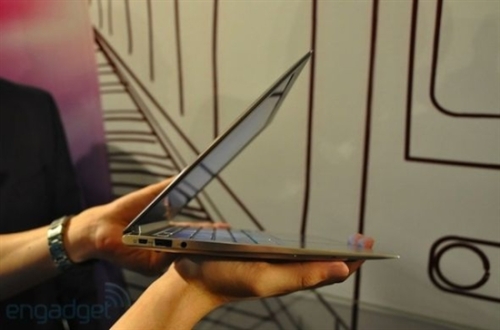 According to foreign media reports, in the era of smart phones and tablet computers, Intel hopes that the Ultrabook will bring new life to the PC. Intel executives said that this new category of powerful, affordable, ultra-thin laptops will account for 40% of the consumer notebook market by the end of 2012.
According to foreign media reports, in the era of smart phones and tablet computers, Intel hopes that the Ultrabook will bring new life to the PC. Intel executives said that this new category of powerful, affordable, ultra-thin laptops will account for 40% of the consumer notebook market by the end of 2012. However, it is still unclear where Intel's Ultrabook differs from Apple's MacBook Air laptop. Part of the reason is that the full development of Ultrabook will take several years. ASUS, Hewlett-Packard, Lenovo, and LG Electronics will introduce the first Ultrabook notebooks during Christmas this year. However, Intel has said from the beginning that the realization of the Ultrabook concept requires several generations of new chips and hardware and software engineering.
Becky Emmett, Intel’s director of media relations, provided details of the Ultrabook development on his blog this week. He said that Intel and its partners need to implement the Ultrabook concept to make major changes in the design, production, and marketing of products and components.
The basic functions of Ultrabooks listed during Christmas this year are well-known: no more than 0.8 inches thick; fast boot from hibernation using Intel Quick Start Technology; 5 to 8 hours battery life; enhanced security features to keep laptops secure and prevent Identity theft.
The first wave of Ultrabook launches will be Asustek's 11.6-inch ASUS UX21 notebooks introduced this fall, followed by the Lenovo IdeaPad U300 and LG Electronics’ P220. Recently there have been rumors that it is difficult for manufacturers to reduce prices to less than $1,000, so the popularity of such laptops is slower than expected.
The second wave of Ultrabooks will be available in the first half of 2012, with the first 22-nanometer Intel processor codenamed "Ivy Bridge." Intel said that this Ultrabook laptop will have a longer battery life, better performance, more powerful security and high-speed data transfer using USB 3.0 and Thunderbolt technology, with Apple Mac and Sony VAIO Z-series notebook computers I/O technology.
The third phase of the Ultrabook will adopt the new architecture codenamed “Haswell†introduced by Intel in 2014. With this new architecture, Intel plans to change the basic processor design so that the power consumption of the processor is only half that of current processors.
Connecting Terminals,Micro Connecting Terminal,Aluminum Connecting Terminals,Connecting Copper Terminal
Taixing Longyi Terminals Co.,Ltd. , https://www.longyicopperterminals.com